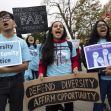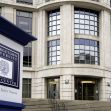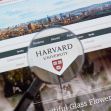Three minority advocacy groups are taking legal action against Harvard University’s legacy and donor admission practices. The lawsuit was filed by lawyers associated with the Chica Project, the African Community Economic Development of New England, and the Greater Boston Latino Network and comes less than a week after the U.S. Supreme Court issued a ruling that put an end to affirmative action in the college admissions process.
The newly filed lawsuit references the high court's ruling in which the conservative majority concluded, “College admissions are zero-sum, and a benefit provided to some applicants but not to others necessarily advantages the former at the expense of the latter.”
The advocacy groups argue that if college admissions must rely strictly on meritocracy, then allowing applicants who come from wealthy backgrounds and legacy families is a violation of that meritocracy.
“This preferential treatment has nothing to do with an applicant’s merit. Instead, it is an unfair and unearned benefit that is conferred solely based on the family that the applicant is born into,” shared Lawyers for Civil Rights in a news release. “This custom, pattern, and practice is exclusionary and discriminatory. It severely disadvantages and harms applicants of color.”
In allowing donors and legacy applicants greater advantages during the admission process, the minority advocacy groups explain that spots at the University that would otherwise be available for students of color are instead allocated for these legacy and donor-affiliated students, a majority of whom are predominantly White.
Removing this preferential treatment would allow greater opportunities for applicants of color, explain the plaintiffs. The lawsuit reads, “The need for the Department of Education to put a stop to this discriminatory practice is particularly acute now that the Supreme Court has severely limited the use of race as a factor in higher education admissions processes, which is expected to have a negative impact on campus diversity.”
The lawsuit highlights that minority students are typically underrepresented among student applicants who have the advantage of a donor or legacy preference. According to Harvard University statistics of admissions offered for the class of 2027, roughly 40.8% of accepted undergrads are White while Black students make up 15.3% of accepted applicants, and Latinx students make up 11.3% of accepted applicants. Asian Americans, who have brought forward their own lawsuits against the university regarding affirmative action, make up roughly 29.9% of Harvard accepted applicants.
A recent study published in the National Bureau of Economic Research highlights the racial disparities that exist among donor and Legacy applicants. The study found that 43% of white students who were admitted into the school were recruited athletes, students from legacy families, children of faculty and staff, and students who are on the dean's interest list, a list of applicants whose parents or relatives have donated to the university. Additionally, almost 70% of all legacy applicants were White students.
The lawsuit also highlights these disparities by detailing the University's overall acceptance rate of 3.2% in 2022. However, the average admit rate for applicants who had donor families or relatives was 42%. For legacy applicants, that rate was 34%.
The complaint goes on to detail that the Harvard admissions process marks specific applications with indicators that a student is a legacy or donor applicant or should otherwise receive preferential treatment. Because of these special application tacks that are made visible to admission officials, a legacy or donor applicant is nearly 20 times more likely to have an interview by Harvard admissions officials.
In addition to seeking the end of donor and legacy admissions at the University, the lawsuit is asking the U.S. Department of Education to investigate donor and legacy practices and “the resulting unjustified disparate impact.”






